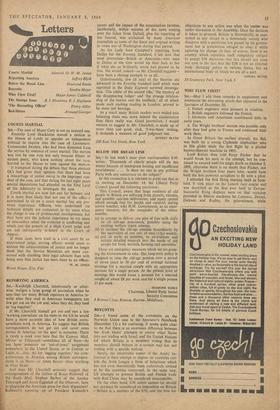BOYCOITS
SIR,-1 found some of the comments on the Norwich Union ease in the Spectator's Notebook (December 13) a bit confusing. It seems quite clear to me that there is an enormous difference between the Arab States' attempts to coerce other States into not trading with Israel, and the United Nations (of which Britain is a member) voting that its members should behave in a certain way (i.e. not trading with a specific nation).
Surely, the intolerable aspect of the Arabs' be- haviour is their attempt to impose on countries out- side the Arab League a form of behaviour which has not even theoretically been collectively arrived at by the countries concerned. In the same way, US attempts to prevent British and French trade with Red China may be considered unacceptable. On the other hand, UN action cannot (or should not anyway) be considered an imposition on Britain —Britain is a member of the UN, and the time for
objections to any action was when the matter was under discussion in the Assembly. Once the decision is taken to proceed, Britain is theoretically as com- mitted as any citizen in a democratic society who disagrees with a particular law passed by his govern- ment but is nonetheless obliged to obey it while agitating for change. In fact, of course, there is no country which considers itself completely obliged to accept UN decisions—but this should not close our eyes to the fact that the UN is not an external body 'dictating' policy to various States, but an international body of which we arc all a part.
SANDRA MEYER






























 Previous page
Previous page